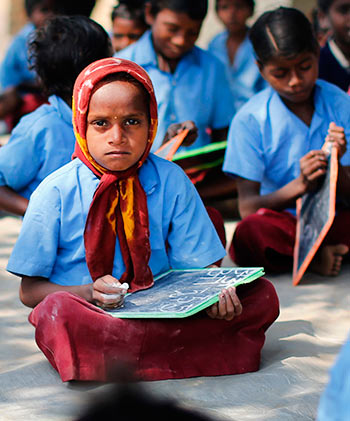The last thing the country needs in a globalising and technologically advancing international business environment is a poorly educated workforce, says Subir Gokarn in his latest column.

Of all the issues on the policy table, education is perhaps the domain allowing the smallest margin of error.
Decisions taken today will have consequences that persist for decades and cannot be reversed.
Universal and high-quality primary education will provide the foundations for all the initiatives related to production, productivity and employment to achieve success.
Its absence will undermine the effectiveness of all these.
On this score, the country's record is not great.
While almost universal enrollment in primary school is certainly an achievement, it appears to be coming with a significant trade-off in quality.
Most importantly, there is a significant drop-off in enrollment in secondary school, suggesting, among other things, inadequate preparation at the primary stage.
The last thing the country needs in a globalising and technologically advancing international business environment is a poorly educated workforce.
Students vs stakeholders: Who pays the price?
My colleague Rohan Sandhu and I just co-edited a volume, Accelerating Access to Quality Education*.
This brings together, besides an editorial introduction, 16 contributions from a variety of stakeholders in primary education.
It also has six "last mile" perspectives: reflections on priorities and challenges from school leaders, teachers and education innovators.
It provides a rich mix of insights and action recommendations to address the core objectives of any education policy, which are captured in the title of the volume.
The framework bringing these three objectives together aligns closely with the themes that the Ministry of Human Resource Development is focusing on as it builds up to a new education policy.
I cannot capture the range and richness of the recommendations in this column; instead, I want to try and synthesise the perspectives in terms of alignment between the objectives themselves and the roles and responsibilities of different stakeholders.
At the first level, clearly, the trade-off between access and quality is a high price to pay.
Lowering standards just to increase numbers may seem like a price worth paying in the short term, but, as I argued earlier, the consequences of inferior quality will beset people for a lifetime.
The policy objective must be to ensure that expansion of access is accompanied by a host of measures to improve quality and sustain it. And looking at the challenges posed by numbers, there isn't any time to lose.
Rapid expansion of capacity can only be done by experimenting with all kinds of delivery mechanisms.
Many of these are already being tried in various situations, but typically at a small scale; how to scale or replicate successful models must be a central question in the policy debate.
In achieving these objectives, four broad stakeholder groups need to find alignment around the pivotal stakeholders, the students.
These are teachers, parents, the community and the government.
A number of perspectives on this critical group are presented in the volume and were discussed at a launch event organised last week.
School leaders worry about their ability to motivate teachers to adapt new methods of delivering content and stimulating creativity in a very rigid contractual structure.
Teachers find themselves being pulled between conflicting demands from basic teaching and increasing administrative loads from compliance requirements of various programmes.
A no-detention policy, while it may have merits, increases the dispersion of capabilities in each class, making it difficult to pay attention to lagging students or mentor promising ones.
There appears to be a compelling case for re-designing leader and teacher training programmes.
Teachers vs Parents: The communication gap
The basic BEd syllabus seems not to have been changed for many years, even as there have been so much movement in content, pedagogy and technology.
Leaders and teachers equipped with the foundations to deal with this movement are a necessary condition for the alignment between access and quality.
Parents are, obviously, an essential stakeholder group, but are they playing their role as wholly as they need to?
The dominant view is that there is inadequate communication between teachers and parents on issues that really matter.
There is, of course, a temptation to de-prioritise this particular channel of communication.
The majority of students may be first-generation school-goers.
Parents essentially see schools as custodians, not to be questioned, whatever they may do. And so on. But if the inadequate participation of parents in the process contributes to a deterioration in quality, ways must be found for more productive engagement.
There are promising innovations that can template the interaction between teachers and parents independent of socio-economic conditions.
These need to be encouraged in order to allow this critical stakeholder group to play its role to the fullest.
The role of the larger community cannot be questioned, but we need to move from generalities to specifics.
Need for accountability
A wide range of non-governmental organisations have been active in exploring alternative delivery mechanisms, many of which show promise on quality criteria.
Whether these models can be used to expand access is a question that needs to be answered quickly.
Systematically documenting and disseminating experiences, successful and failed, should be a priority for this network.
Significantly, NGOs may play a productive role in partnering with public school systems in implementing new methods of both teaching and assessment.
Holding public systems to account on the basis of transparent criteria is an important role for the communities that these systems serve.
Finally, there is the role of the government, which could fill a volume by itself. But let me highlight three important considerations in the context of this framework.
What the government can and must do
First, it must create the space to encourage every promising model of delivery to scale up, subject to some clearly defined quality criteria being met.
This means both more efficient utilisation of current capacity and legitimising innovative new models.
There are outstanding examples of both cost-reducing and pedagogical innovations, which could greatly accelerate access wit quality.
These must figure prominently in the choices the central and state governments will make.
Second, it must institutionalise assessment methods that test capabilities across an entire range, which is the irreversible trend globally.
Third, many of the changes that are being suggested in relation to the roles and responsibilities of the other stakeholders require government to act, whether it is teacher training or more effective parental involvement.
It is necessary to provide broad guidelines, but the temptation to over-engineer the processes must be resisted. Government cannot and should not be a dominant or overbearing partner in this process.
Image used for representational purposes only. Credit: Ahmad Masood/Reuters
*Accelerating Access to Quality Education is accessible at www.brookings.in/in_focus_category/accelerating-access-to-quality-education/
The writer is director of research, Brookings India, and former deputy governor, RBI. These views are his own.










